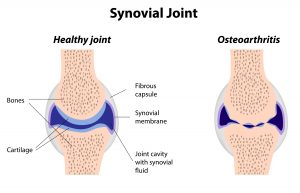 Clinicians and researchers at the Physical Medicine and Rehabilitation Center, Bethany Medical Center, Kansas City and the University of Kansas Medical Center, studied the effect of a 10% dextrose solution on patients with osteoarthritis of the knee. Some of the study patients had anterior cruciate ligament (ACL) laxity or “looseness,” a factor which worsens knee osteoarthritis. The study was also designed to examine the effect of Prolo on ACL laxity.
Clinicians and researchers at the Physical Medicine and Rehabilitation Center, Bethany Medical Center, Kansas City and the University of Kansas Medical Center, studied the effect of a 10% dextrose solution on patients with osteoarthritis of the knee. Some of the study patients had anterior cruciate ligament (ACL) laxity or “looseness,” a factor which worsens knee osteoarthritis. The study was also designed to examine the effect of Prolo on ACL laxity.
The Study Method
- Subjects with osteoarthritis of the knee of at least 6 months duration were recruited by mail. All subjects had moderately severe joint space narrowing and obvious osteophytes (bone spurs). Average age was 63 years.
- Subjects were randomly assigned into two groups, one that received Prolotherapy or a group that received a sterile water solution. All subjects rated the severity of their pain at rest and during activity, as well as their estimate of degree of swelling and the number of knee bucklings over the last two months. All subjects received injections at baseline, 2 and 4 months, with the Prolo group continuing treatment at 6, 8 and 10 months.
Results
- At 12 months, there was 40% less pain, 63% less swelling, 85% less buckling and 14º increased flexion in the Prolo group. This amount of improvement in flexion has not been seen in other clinical studies. There was also improvement in cartilage thickness and a decrease in osteophytes.
- At 12 months 8 of 13 subjects with ACL laxity at baseline no longer could be considered lax and this is in a group of patients with one or more complete ruptures. There were no treatment complications.
Why Does Prolo Work?
- Prolotherapy stimulates tissue repair by raising growth factor levels or increasing their effectiveness. The Prolo solution creates a brief inflammatory response that stimulates repair cells to the site of injury. New cells and tissue can be laid down in an organized fashion and reach maturity in 6-8 weeks.
- There were 38 knees in this study that had no cartilage in at least one compartment. The long history of pain (8 years) and patient average size (195 lbs) speaks to the strength of the clinical outcomes.
Prolotherapy is helpful for a variety of musculoskeletal conditions including joint pain, arthritis, and tendonitis. Dr. Lehmann is ready to evaluate you and customize your plan of care. Contact us at frontoffice@csspm.com or 281-357-5454 to set up an appointment. Houston Spine & Sports Medicine is located in The Woodlands and is easily reached from Tomball, Conroe, Magnolia, Kingwood, Spring, and Houston.
Reeves, K. & Hassanein, K. (2000). Randomized prospective double-blind placebo-controlled study of dextrose prolotherapy for knee osteoarthritis with or without ACL laxity. Alternative Therapies, 6(2): 68-79.